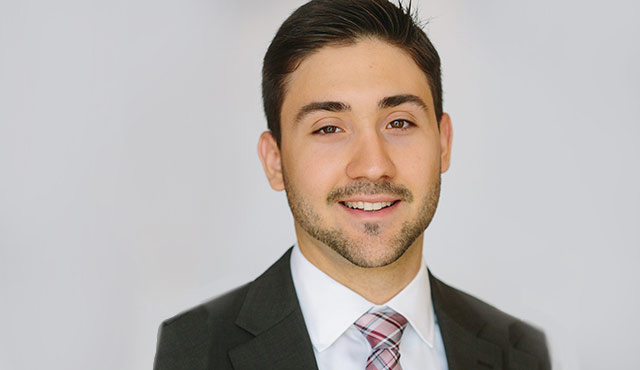
How a Knight internship put a recent college grad’s broad experience to work

Knight Foundation’s summer internship program offers college students and recent college graduates a chance to help foster informed and engaged communities through our work in the arts, journalism and media innovation, and cities. Applications are now open for the paid, 10-week summer program.
Below, Lucas Hernandez, special assistant to Knight President Alberto Ibargüen, talks about his work as an intern with the Learning and Impact team in summer 2014. Following his internship, he was hired as an associate on the Media Innovation team. He moved to his current role in June 2015.
What are your responsibilities? How has your role evolved?
The title is “special assistant to the president,” but this is one of the cases where the title doesn’t begin to explain the story. The role evolves every day. There are procedural constants, i.e. the review of all grant agreements before their execution and the preparation of talking points for external appearances Alberto has throughout the year. The majority of time, however, I am operating across the foundation on projects of different complexity. For example, helping to execute millions of dollars worth of grants to organizations like National Public Radio, or coordinating high-profile events. The uncertainty of it is refreshing and invigorating.
As the state of work and how people earn a living continues to be disrupted, I think being comfortable with such ambiguity, while also getting the job done, is critical. This position and organization affords me that luxury while also allowing me to contribute points of view about Knight’s work or strategy. This is what I think sets our foundation apart.
What’s the first thing you do in the morning when you get to work?
I make a point to not open e-mail. I begin with an article or video or two to help prime my thinking. This is usually motivated by a podcast I listen to during my commute or a meeting happening later that day.
You attended Rollins College. What did you study?
I studied a way of thinking. My degree is scoped as one in international relations and Spanish, but what I learned goes much further than that. Liberal arts institutions, and especially Rollins, equip students to function broadly in the world, instead of in one narrow area of focus.
For example, I took a field study to Costa Rica focused on environmental science. I conducted research on opportunity-based entrepreneurship in China, studied economic and political systems abroad in Santiago, Chile, while also learning about the writing of Sir Arthur Conan Doyle and the psychology of memory. The common thread is global citizenship and a broadening of the mind so that you adapt to situations with ease, or at least comfort.
How did you first hear about Knight’s internship program?
My Knight journey began while I was still at Rollins. I learned about TurboVote, a project Knight funded, and began to read about the rest of Knight’s work. That led me to be curious and send a cold e-mail to Mayur Patel, who was then the VP of the Strategy and Assessment program [now the Learning and Impact program] of Knight Foundation. He graciously accepted my meeting request and one day while visiting my parents in Miami I chatted with him about the work.
After my fellowship in New York City government in 2014, I reached out to Mayur who recommended the internship program. I owe a lot to him for that.
Describe your internship experience. How did it help you gain a better understanding of Knight’s work?
Most importantly, it was a nimble and awesome team. Going into any work environment I think those two ingredients make the work most rewarding. Because the scope of the work—to help evaluate and connect the lessons in our grant-making—is so significant, it ends up touching every part of the foundation.
Whether it’s working on assessment projects or understanding how to best communicate what we learn to the field, it is a wide-ranging undertaking. Couple this with having only two people on the [team] at the time, it really accelerated my learning curve and introduced me to almost everything Knight Foundation does.
What was the most valuable part of your internship experience?
The most valuable thing definitely was the relationships, both within the intern class of seven people but also with my team. Those continue to go a long way for me today—especially guidance from my then-supervisor, Jon Sotsky.
Did you have any assumptions about Knight’s work that changed as a result of your internship experience?
Not so many assumptions, but I had quite a few enlightening moments. I just simply never thought of journalism, and media more broadly, as such a critical force in society. Getting introduced to the work and the motivations for funding certain projects increased my awareness and how I value those fields.
How does Knight’s mission fit with your long-term goals for your career?
Squarely. Although I cannot be sure of the exact trajectory I will follow, I know that playing a role in building more informed and engaged communities will be constant. I am passionate about how policy, media and technology collide to provide the greatest, and more democratic, benefit for people and communities, and see that in everything we do here.
Any advice for our future interns?
Value the experience. The philanthropic sector gives you a unique vantage point in the broader scope of our society, and how, and where change happens. This won’t be apparent if you come in expecting a defined experience. Also, curiosity adds the most value to Knight and our work, so allow yourself to be an equal participant in the conversations you take part in.
To apply to Knight Foundation’s internship program please send a cover letter and resume to [email protected].